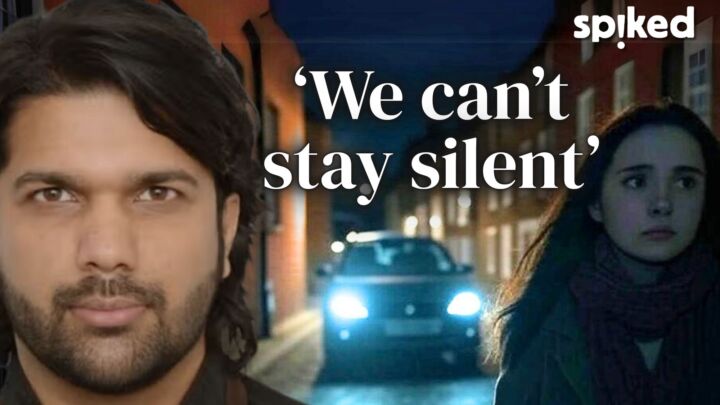Abortion: the freedom to make tough choices
Essay: The anti-choice lobby’s claim that abortions always impact on women’s mental health is moralism masquerading as science.

Want to read spiked ad-free? Become a spiked supporter.
A recent commentary published in the journal Contraception by Julia Steinberg and Nancy Russo argues that guidelines should be developed ‘for others to follow when evaluating research on abortion and mental health’ (1).
Their argument is that shoddy studies continue to be published in peer-reviewed journals appearing to show an association between induced abortion and mental illness, despite the fact that two major reviews of the literature – one by the American Psychological Association (APA) (2) – have identified the weaknesses in studies purporting to find such an association.
Guidance on good research is needed, suggest Steinberg and Russo, because ‘studies of abortion and mental health require researchers to make study design and data analyses choices’, and these may ‘create bias towards or against a specific, directional claim’. In lay terms, this means that scientific studies that claim to show an association between abortion and mental ill-health can be politically motivated, and designed in such a way that they will find ‘evidence’ to support the a priori claim that abortion is damaging to women’s health. This is not sound science, but a particular moral or political claim masquerading as science.
Steinberg and Russo suggest that formalising guidelines about how to evaluate studies on the controversial question of whether abortion leads to negative mental health outcomes ‘will improve the quality of future research and the debate around clinical and regulatory measures proposed in response to the existing body of research’.
Separating politics from science
Those familiar with the debate about abortion and mental health will sympathise with Steinberg and Russo’s frustrations with the publication of biased studies. The attempt to present moral arguments against abortion in the form of scientific ‘evidence’ about the health problems they allegedly cause for women has been a long-running strategy of the anti-abortion movement, and as such represents a cowardly and dishonest attempt to scare people around to its point of view.
Over the years, Russo and her colleagues have invested a significant amount of time and energy in examining the research about abortion and mental health, and evaluating it in a rigorous and nuanced way. The balanced character of the debate about this question to date is testament to their work. But can the question of whether abortion is associated with mental illness be resolved within the domain of scientific studies? Is it right to expect that resolving this debate should be the sole responsibility of those few individuals who have expertise in dealing with the evidence?
The first problem is that the ‘abortion and mental health’ issue is not simply a scientific or medical question, but a moral and political one. In her 2003 critique Abortion, Motherhood and Mental Health, the sociologist Ellie Lee examines the history of the anti-abortion movement’s attempts to present its claims in scientific terms, by trying to prove the existence of a specific ‘post-abortion syndrome’ (PAS) (3). In this way, argues Lee, claims that were previously ‘moralised’ have become ‘medicalised’. As moral claims have failed to win the arguments, medical claims are used in a way that attempts to shut down debate about the rights and wrongs of abortion, with the arguments recycled as a ‘woman-centred’ claim that abortion damages women’s health.
The politicised character of much research purporting to show that abortion causes mental health problems is damaging both to the debate about abortion, and to the integrity of science. But there is a limit to the extent to which ‘better science’, as proposed by Steinberg and Russo, can address this broader problem of politicisation.
Sound science is always a worthwhile goal, and there are precedents when it comes to establishing methodological guidelines for research. Steinberg and Russo are not suggesting that there is one ‘right answer’ to whether abortion is associated with mental health problems in some women. As the APA review states:
‘Well-designed, rigorously conducted scientific research would help disentangle confounding factors and establish relative risks of abortion compared to its alternatives, as well as factors associated with variation among women in their responses following abortion. Even so, there is unlikely to be a single definitive research study that will determine the mental health implications of abortion “once and for all” given the diversity and complexity of women and their circumstances.’
But even if it were proved beyond a shadow of a doubt that abortion was not associated with mental illness in any women at all, this would not stop the anti-abortion lobby from claiming that it did, or researchers from trying to find contradictory evidence. In this politicised context, there is a danger that attempting to regulate for better science could be interpreted as an attempt to restrict debate or alternative perspectives on the question.
The 2008 APA review, and to a lesser extent the 2004 evidence-based guideline on induced abortion produced by Britain’s Royal College of Obstetricians and Gynaecologists (4), have shown that the medical establishment is generally capable of weighing up the evidence that exists about abortion and mental illness, and making a judgement as to its worth. This is important, as it indicates that shoddy studies are not inevitably taken at face value.
However, the more important point is that abortion rights, provision and women’s experience are not questions that can or should be resolved through a narrow examination of how abortion impacts upon women’s mental health. If the issue of how we deal with research around this question becomes pigeon-holed as an area on which non-experts have no contribution to make and for which they have no responsibility, this not only puts an unfair burden on to experts such as Nancy Russo – it also absolves others in the pro-choice movement from engaging with this question in relation to broader insights about women’s experience and the role of abortion policy.
Confusing sadness with mental illness
Part of the reason why there has been an explosion of biased research into the association between abortion and mental illness is because of a wider interest with mental health in general, and the way that mental illness itself has become expanded as a concept and politicised by claims-makers.
It is now routinely argued that there is a direct relationship between difficult life events, such as losing one’s job, moving house or studying for exams, and depression. This leads to attempts to manage the issues within a medical framework, such as in the recent initiative by the UK government to provide a form of therapy for those unemployed as a consequence of the recession (5).
The glib assumption that life’s difficulties lead directly to mental illness is a problem on two main fronts. Firstly, it simplifies this extremely complex field, and thereby acts as a barrier to understanding specific cases of mental illness, diverting expertise and resources away from those who need them. Secondly, it contributes to a brittle and one-sided understanding of normal human emotion, which implies that happiness is the emotional norm and all deviations from this should be pathologised as illness.
The expansion of mental illness is a key feature of Ellie Lee’s critique, where she examines this trend specifically in relation to reproductive events – abortion and childbirth. Clearly, both such life events are significant for women, and may involve a range of emotional reactions: it would be facile to think that either abortion or childbirth could be considered free from any psychological cost. But because emotional reactions are now problematised within the framework of mental health and illness, both abortion and childbirth tend to be discussed outside of the context of women’s lives, and pitted against one another in the narrow terms of which is most likely to make women ill.
Lee illustrates this with the example of the increasing diagnoses of post-natal depression amongst mothers who experience negative emotions following the birth of their babies. While a proportion of new mothers may experience severe clinical depression, which requires psychiatric treatment and management, the experience of this group has tended to be collapsed together with the experience of those new mothers feeling tired, anxious and unhappy following the birth of their babies, but whose emotional state will recover with time.
In this context, the label of post-natal depression risks pathologising a range of normal, negative emotions and the women who exhibit them, implying that women who give birth ‘should’ be feeling happy and relaxed, and those who do not should be labelled mentally ill. This diverts attention and resources away from the minority of women suffering from severe mental health problems, and risks making mothers generally defensive about their emotional state. It has also meant, as Lee shows, that arguments about the mental health cost of abortion have been limited by concerns about the (arguably greater) mental health costs of childbirth.
Examining the claims and counter-claims about abortion and childbirth made in this way, one has to ask: where does this leave women? Unless it is to be argued that women should avoid pregnancy and childcare altogether because the psychological cost of both is too high, discussion and policy has to recognise that women will have abortions and babies regardless of whether it makes them happy or sad at the time – and that women who have negative experiences of abortion or childbirth may nonetheless go on to have another abortion, or another baby, because that it what is right for them in the long term.
In this case, an attempt to regulate women’s emotions according to how they ‘should’ be feeling is profoundly unhelpful. Most would agree that it is unreasonable to expect that a woman who has had an abortion will be ‘happy’ as a result. Abortion is not a choice women make to improve their lives, but a resolution to the unexpected problem of unintended or unwanted pregnancy – the least bad option in the circumstances.
If the negative emotions that may follow this event are pathologised as markers for mental illness rather than accepted as normal and understandable reactions, this de-contextualises women’s experiences and dehumanises their emotional reactions. The question should not be whether a woman feels happy or sad immediately following an abortion, because all women may feel differently and there is no ‘right’ way of feeling. Rather, the question should be: was that decision the best one for her to make in terms of the rest of her life?
Women’s decision-making
In this regard, it is worth looking at a recent study led by David Fergusson of Christchurch, New Zealand. Fergusson and colleagues have conducted a set of studies examining abortion and mental illness. This work is often received by the mainstream press as further evidence to back up the anti-abortion cause, as indicated by this recent headline from the UK Daily Telegraph: ‘Abortion can put women at increased risk of mental health problems, says study.’ (6) But while Fergusson’s work does find an association between abortion and mental illness, its findings are more subtle and interesting than the mainstream headlines would imply.
The most recent study, on ‘Reactions to abortion and subsequent mental health’, is published in the British Journal of Psychiatry (7). Fergusson et al found that women who have abortions report high rates of both positive and negative emotional reactions. Those women reporting negative reactions ‘had rates of mental health disorders that were approximately 1.4 to 1.8 times higher than those not having an abortion’.
There are a number of limitations to this study, which the authors recognise, and to this extent the findings need some interrogation. Certainly, understanding the precise relationship between abortion and mental illness that is found by this study may well be beyond the scope of those who lack expertise in the field of mental health. But many of the study’s other findings are easily understandable, and worthy of consideration by those who are simply familiar with women’s experiences following abortion and committed to the pro-choice perspective.
For example, 90 per cent of women stated that their abortion was ‘definitely the right decision’, and only two per cent said it was ‘definitely the wrong decision’. This indicates that women are capable of taking hard decisions that might make them unhappy at the time, but with the recognition that this will be the best thing for them ultimately.
Where the authors found an increase in mental health problems among women who had had abortions, these were women who had reported high levels of distress. When taken with the finding that the vast majority of women believed abortion was the right option for them, this in no way indicates that abortion makes all women ill, or that women’s access to abortion should be restricted. Rather, it supports what those working in reproductive healthcare already know: that women seeking abortions should be treated with kindness and sympathy, that abortion should be provided within a culture that does not treat is as something that is morally bad, and that women should make, and be sure about, their own decision to have an abortion.
It is also worth noting in this context that it should not be assumed that all women will experience abortion as an emotionally difficult event: some may simply see it as the pragmatic response to a problem, and be simply relieved when it is over. In these cases, ‘too much’ sympathy or counselling could cause problems of its own, in encouraging women to feel that they should be more upset than they are and thereby increasing their levels of distress. As with all difficult life events, individuals’ circumstances and reactions are different, and sensitive care will focus resources on those who have particular needs or experience greater difficulties.
Furthermore, the study’s conclusion – that there is no evidence that abortion reduces mental health risks, and that this raises important questions about ‘the practice of justifying termination of pregnancy on the grounds that this procedure will reduce risks of mental health problems in women having an unwanted pregnancy’ – is not one with which those committed to the pro-choice perspective would necessarily disagree. As was argued in the 2008 British debate about the abortion law, it would be far better to have a law that allows for women to have abortions on request, rather than forcing both women and doctors to engage in a pretence that the discussion is about their mental health.
The need for a wider debate
Whatever their motivations, researchers will continue to examine the question of abortion and mental health, and the medical establishment will continue to argue it out. But the question of whether women should be permitted or denied access to abortion is a moral and political one, which will never be resolved in the domain of science. If this debate is put aside for ‘the experts’ to sort out according to evidence alone, pro-choice advocates will be avoiding their own responsibility for creating a culture in which the perceived rights and wrongs of abortion can be argued out openly and honestly.
Meanwhile, the question of how women experience abortion will be affected by their personal circumstances and the culture in which they live, and these experiences should be recognised and examined for what they are: not as narrow markers for better or worse mental health, but emotional reactions that should be taken into account as a standard part of sensitive abortion care. It does women no favours to imply that abortion will make them depressed, or that it will have no emotional impact upon them whatsoever. What matters is that they are recognised as being capable of making these decisions, and weighing them up within the context of their own lives.
Jennie Bristow is editor of Abortion Review, where this essay was first published. Email Jennie at {encode=”[email protected]” title=”[email protected]”}
Previously on spiked
Jennie Bristow pointed out that there is little relation between abortion rates and the recession. She also restated the moral case for women’s right to choose and offered 24 reasons to keep 24 weeks. Helen Searls looked at Obama and the politics of abortion. Ann Furedi urged officials to stop playing politics with abortion and explained why the case for abortion cannot be massaged. Ellie Lee took a look at the history of the abortion debate and made the case for Early Medical Abortion (EMA). Or read more at spiked issue Abortion.
(1) ‘Evaluating research on abortion and mental health’, Julia R. Steinberg, Nancy Felipe Russo. Contraception, Volume 80, Issue 6, Pages 500-503 (December 2009)
(2) Report of the APA Task Force on Mental Health and Abortion. American Psychological Association, 13 August 2008
(3) Abortion, Motherhood and Mental Health: Medicalizing reproduction in the United States and Great Britain, by Ellie Lee. Aldine Transaction 2003. Buy this book from Amazon (UK).
(4) ‘The Care of Women Requesting Induced Abortion’. Royal College of Obstetricians and Gynaecologists, 2004.
(5) Jobless to be offered ‘talking treatment’ to help put Britain back to work, Guardian, 4 December 2009
(6) Abortion can put women at increased risk of mental health problems, says study, Daily Telegraph, 2 November 2009
(7) ‘Reactions to abortion and subsequent mental health’, David M. Fergusson, PhD, L. John Horwood, MSc and Joseph M. Boden, PhD, British Journal of Psychiatry (2009) 195: 420-426. doi: 10.1192/bjp.bp.109.066068
Who funds spiked? You do
We are funded by you. And in this era of cancel culture and advertiser boycotts, we rely on your donations more than ever. Seventy per cent of our revenue comes from our readers’ donations – the vast majority giving just £5 per month. If you make a regular donation – of £5 a month or £50 a year – you can become a and enjoy:
–Ad-free reading
–Exclusive events
–Access to our comments section
It’s the best way to keep spiked going – and growing. Thank you!







Comments
Want to join the conversation?
Only spiked supporters and patrons, who donate regularly to us, can comment on our articles.